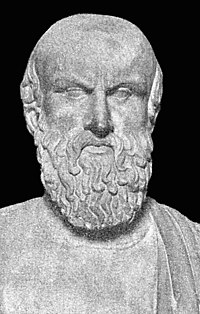
Back Aischulos Afrikaans Aischylos ALS Esquilo AN إسخيلوس Arabic اسخيلوس ARZ Esquilo AST Esxil Azerbaijani Эсхил Bashkir Эсхіл Byelorussian Эсхіл BE-X-OLD
Aeschylus | |
|---|---|
 Aeschylus | |
| Born | c. 525 BC Eleusis, Greece |
| Died | c. 456 BC Gela, Silcy, Italy |
| Occupation | Playwright; soldier |
| Nationality | Greek |
| Period | Ancient Greece |
| Genre | Tragedy |
| Subject | Greek life and history |
| Notable works | The Persians |
| Notable awards | Won at the Great Dionysia 13 times. |
| Children | Euphorion and Euæon |
| Relatives | Philocles (nephew) |

Aeschylus (525 BC – 456 BC) was an Ancient Greek poet and writer. He wrote about 70–90 plays.[1][2] Only six of his tragedies have survived complete. Aeschylus was the earliest of the three greatest Greek writers of tragedians. The two others were Sophocles and Euripides.[1][3]
Aristotle said that Aeschylus added more characters into his plays. His characters spoke to each other and not just to the chorus. This made it easier to create drama between the characters.
One of his plays, The Persians, was about the Persian invasion of Greece. Aeschylus had fought in this war. People studying Greek history use his play as an important source of information. The war was so important to the Greeks and to Aeschylus, that the writing on his grave only talks about his part in the Greek victory at the Battle of Marathon. There is nothing about the plays he wrote.
- ↑ 1.0 1.1 Freeman 1999, p. 243
- ↑ Cite error: The named reference
P222was used but no text was provided for refs named (see the help page). - ↑ Schlegel, August Wilhelm von. Lectures on dramatic art and literature. p. 121.